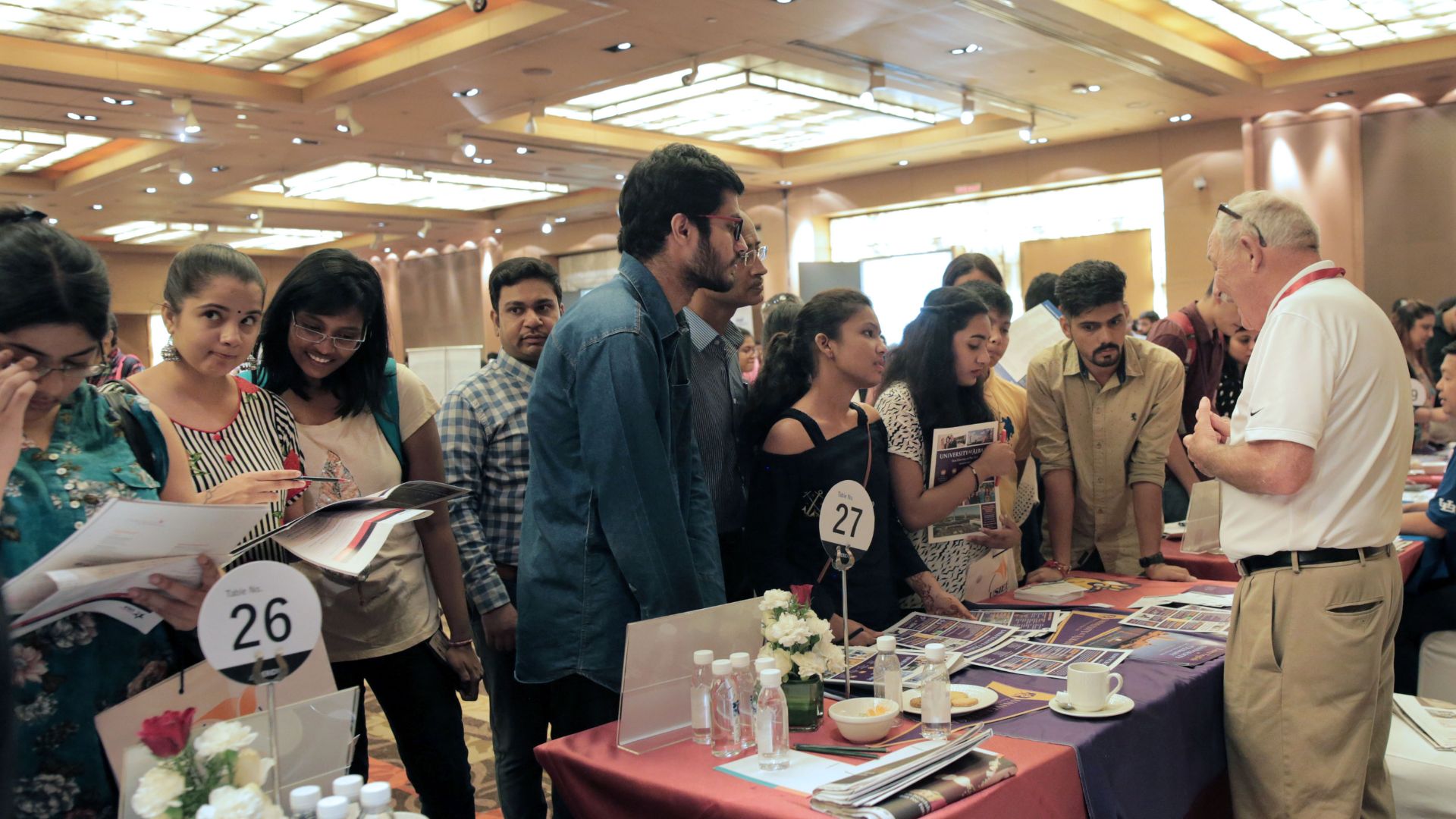A guide for prospective students on how they can get the most out of U.S. university fairs.
July 2019

Prospective students interact with a U.S. higher education institution representative at a university fair. Photograph courtesy EducationUSA, USIEF.
For many prospective students, attending a U.S. university fair is an essential part of the journey toward choosing the right university, and crafting a successful application. Students get to have one-on-one conversations with university officials, who are the direct source of information, learn about the unparalleled opportunities that exist in the United States, share ideas with peers and get expert advice on admission tests, applications, funding and more. Preparing well for these events can give students the confidence to create meaningful connections with the representatives of the schools they want to attend.
EducationUSA at the United States-India Educational Foundation (USIEF) has been organizing “Study in the U.S.” fairs for almost two decades and helping students get the most out of them.
Students must ask themselves some important questions when they begin considering higher education in the United States.
Answering these questions will also help students derive the most out of the university fairs.
Before the fair
Students should research the colleges and universities ahead of time to find those that match their criteria. There are more than 4,700 accredited institutions of higher education in the United States. Students have their own unique expectations from college life, and the choice of the university must be influenced by these expectations. Students may have different parameters for shortlisting colleges. But, they must keep in mind the preferred course, costs, geographical location, size, climate, facilities and proximity to family, among other factors.
Students should make a short and crisp list of questions to ask the U.S. university representatives at the fairs. Since most U.S. universities review applicants holistically, admissions representatives can’t tell students if they will be admitted to a program until they apply. Questions about GRE, SAT or GPA cut-offs and other profile review requests are generally not productive. Instead, students should focus on asking questions related to what they want to study, their research interests, job outcomes and so on.
“The EducationUSA fairs have always been very productive, with interested students and parents,” says Melissa Tixeira, International Recruitment Adviser for Colorado State University. “Students should always ask questions on campus life, housing and meals, scholarships, career service center, job fairs, etc. and avoid questions on immigration and permanent residency, full funding, essay or statement of purpose edits, etc.”
During the fair
Students should attend the presentations by university representatives at the fair. These give an overview of the programs they offer.
It is important for students to budget their time and maximize their interaction with the university representatives. If the conversation becomes lengthy and detailed, students can always suggest a second meeting in-person, over the phone or Skype. Having a list of questions in advance could help them stay on track.
Students should take notes about all the valuable information collected from university representatives. Write down any general impressions and anything that needs to be remembered accurately. This exercise will help in taking decisions and writing application essays.
After the fair
If students are unable to get responses to their queries, they should write to the representatives after the fair and also thank them for their time. This will help to showcase genuine interest in the specific university.
It is great to know what you want to study and pre-select your major based on your interests and academic needs. At the same time, it is also important to stay open to other possibilities. Representatives might share information that gets you excited about a program you may not have considered initially.
“Grab a business card from a representative and feel free to reach out to her/him with any questions about application requirements, status and more,” says Katherine Beczak, assistant director, Office of Part-Time and Graduate Enrollment Services at Rochester Institute of Technology, New York. “We are happy to be your point of contact and liaison with the university. That’s what we’re here for.”
Rupali Verma is an EducationUSA adviser at United States-India Educational Foundation, New Delhi.
COMMENTS